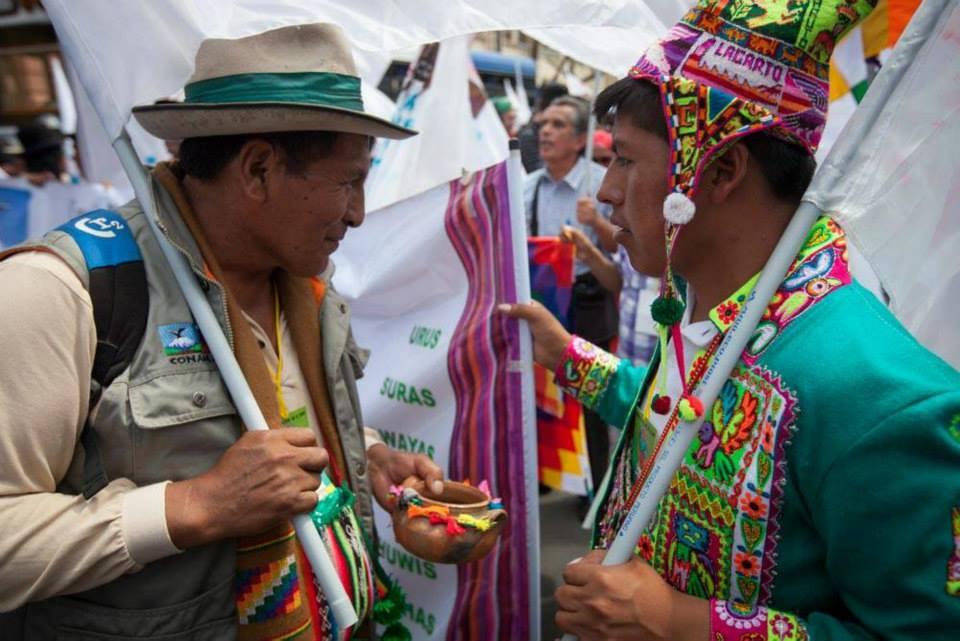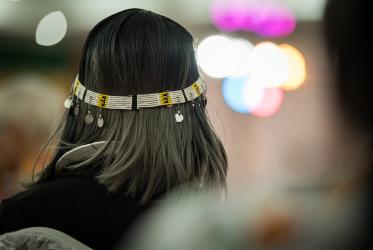Climate justice has been the focal point of the World Council of Churches (WCC) advocacy strategy at 20th Conference of the Parties (COP) of the United Nations Framework Convention on Climate Change (UNFCCC), which concluded on 12 December in Lima, Peru.
Overall, the WCC’s participation at the UNFCCC aims to broaden and deepen the discussion and understanding about climate change and human rights. At the official side event at COP 20, in meetings with government delegations and throughout activities held at the Peoples’ Summit, the WCC initiatives has been raising awareness on climate justice and supporting the work of other partners and networks.
“Climate change threatening human rights: challenges and actions” was an official side event held on 10 December at the COP 20 promoted by the WCC in partnership with Religions for Peace, Quaker United Nations Office, Centre for International Environmental Law, Earthjustice and Friedrich-Ebert Stiftung. The event was inspired by the conviction that the increasing impacts of anthropogenic climate change are a grave danger to humankind and nature, severely jeopardizing human rights and life on Earth.
John Knox, UN independent expert on environment and human rights, a speaker at the event, believes that human rights mechanisms are a helpful tool for the work on climate change and clarify the rules on climate policies. “Laws on indigenous people can also have impact on climate refugees,” he said.
The reason for the continuous participation of the WCC in the UN led process on climate change is based on the pursuit of justice, ethics, solidarity, equity and Christian love. These values for God’s good creation, environment, neighbours and the endurance of life in all its forms on our planet earth, were being affirmed through the activities. For over two decades, the WCC has struggled to bring to the international negotiations the voices of the marginalized, advocating for a life to be lived with justice and dignity.
A strong testimony from Victoria Tauli-Corpuz, UN special Rapporteur on Indigenous People, gave evidence that the absence of the state among indigenous people is a direct aspect that increases the destruction of the environment. “The voices I heard here at COP 20 show that environmental integrity is violated every day and that indigenous people are the first one affected in nearly all contexts where nature is suffering,” she said.
Working for climate justice
Tauli-Corpuz’s words inspired Rev. Henrik Grape, officer of the Church of Sweden for sustainable development and member of the WCC delegation in the UN climate talks in Lima. He was also a speaker at the panel, to share why the WCC and its member churches stress climate justice as a key issue in the negotiations on climate change. “The most affected by climate change are those who contributed the least to it. And in the long run, no one will come out as a winner if we don’t turn the curves of emissions and use of natural resources that is still rising. Poor people today, developed countries tomorrow when more and more of the economy will be used for investments in securing infrastructure and other institutions,” reflected Grape.
During a press conference held after the side event in partnership with the Brahma Kumaris World Spiritual University, Dr Guillermo Kerber, WCC programme executive for Care for Creation and Climate Justice, recalled that some UN agencies and international organizations already deal with issues related to climate justice.
“The International Organization of Migration and the United Nations High Commissariat for Refugees have established working groups on ‘climate displaced peoples’, the World Health Organization has dedicated several of its assemblies to the effects of climate change on health, and the UN Human Rights Council has adopted several resolutions on Climate Change and Human Rights,” Kerber said.
The same day, representatives of the WCC delegation had a meeting with the Scottish minister for environment, climate change and land reform, Dr Aileen McLeod MSP. The Scottish government has adopted climate justice as theme as has a climate justice fund allocated to countries where Scotland has a connection.
The issue of climate justice is very much present also in the key document used by the WCC delegation during COP 20, the final statement of an interfaith summit promoted by the WCC and several partners last September in New York.
The links between climate change and human rights were also the focus of a workshop on 11 December promoted by the WCC at the “Peoples’ Summit against Climate Change”, the civil society initiative parallel to COP 20. The initiative was held in partnership with the World Student Christian Federation – Latin America and Caribbean, and Brahma Kumaris.
The COP in Lima has the difficult task of making significant progress in the negotiations for the COP 21 in Paris next year to approve a fair, ambitious and binding agreement that effectively responds to causes and effects of climate change.
The faith voices at COP 20 tried to influence the specific issues of the UNFCCC showing the ethical and spiritual dimensions posed by climate change which particularly affect the poorest and most vulnerable communities. Among those ACT Alliance members are actively involved in following the different tracks of the negotiations: adaptation, mitigation, climate fund, loss and damage etc. The aim is to push state parties to agree on decisions that will effectively respond to threats of the climate. The lobbying work is accompanied by the Act Now for Climate Justice campaign which through creative ways has expressed the urgent need for climate justice in the negotiations.
WCC member churches commit to climate justice at COP 20 (WCC news release of 10 December 2014)
Lima Climate Change Conference - December 2014






